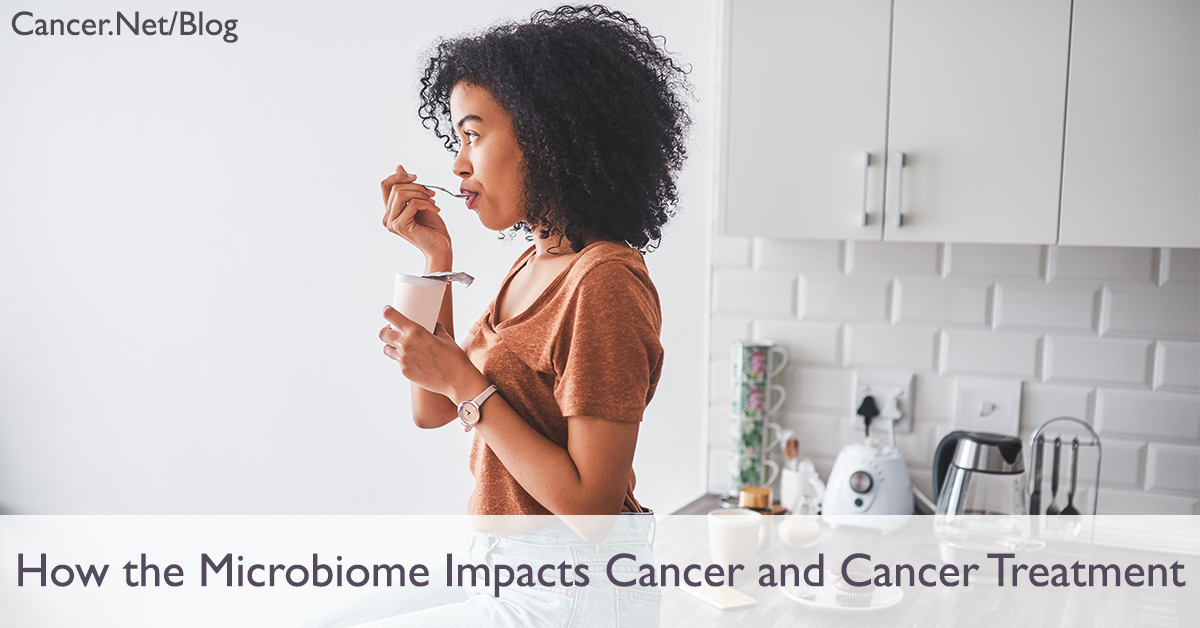
The human body is full of beneficial bacteria that help with everything from breaking down food to fighting illness. Called the microbiome, these bacteria help keep us healthy and alive.
So, what if we could harness these bacteria to help us fight disease or relieve its symptoms? Scientists are studying how replenishing the microbiome could improve the effectiveness of cancer treatments or help relieve the side effects. Early studies show some potential benefits and risks. Here, learn what the microbiome is, why it’s important, and what people with cancer should know about the microbiome and its role in cancer and cancer treatment.
What is a microbiome?
A microbiome is a community of organisms. Your body contains trillions of bacteria and other organisms that are known collectively as your microbiome. You have 10 times more bacteria cells than human cells inside your body.
At birth, babies begin to grow a microbiome, which changes throughout their lifetime based on genetics, lifestyle, age, and other factors. Most of your microbiome is found in your gut.
Each person’s microbiome is different, and what makes up a healthy and thriving microbiome is still a topic of debate and needs further research. But doctors agree that sometimes, our microbiome can become imbalanced, and those changes can be associated with certain diseases, including colon cancer.
What does research show about the microbiome and cancer?
Studies of the microbiome and cancer are in the early stages. Some of what is known is based on studies in mice. For example, researchers have shown that the makeup of the gut microbiome of mice impacts the size and number of their liver cancer tumors.
In other studies with human volunteers, researchers are finding more associations. For instance, some research has found that a more diverse microbiome could improve the effectiveness of immunotherapy treatments for skin cancer. Other research showed that patients with more diverse microbiomes in their guts were more likely to be alive 3 years after a bone marrow/stem cell transplant. Clinical trials are ongoing to learn more about how a healthy microbiome might affect many other types of cancer and related treatments.
How can foods, medications, and supplements affect the microbiome?
Eating nutritious foods high in fiber and fresh fruits and vegetables can help feed the beneficial, or “good”, bacteria that already live inside your gut. These are called prebiotic foods. You can also eat foods that contain beneficial bacteria to help repopulate your gut microbiome. Fermented foods such as yogurt, sauerkraut, and kombucha have these bacteria. They are called probiotic foods.
Besides food, medications and supplements can act as probiotics or prebiotics. Synbiotics are supplements that combine both probiotics and prebiotics.
Cancer treatments such as chemotherapy and radiation therapy can disrupt your gut microbiome. Scientists are studying whether probiotics could help rebalance the microbiome in a person receiving cancer treatment. For instance, some research has shown that probiotics may reduce diarrhea in people receiving chemotherapy for lung cancer and in people who have surgery for colon cancer.
Other scientists worry about the safety and risks of probiotics. For example, many probiotics are sold as dietary supplements. This means they are not regulated by the U.S. Food and Drug Administration (FDA).
Always talk with your doctor if you are thinking about taking any supplements, including probiotics, prebiotics, or synbiotics. This is particularly important to do during cancer treatment.
How might fecal transplants help replenish the microbiome in people with cancer?
A fecal transplant is a fecal sample taken from a healthy person that is then inserted into another person. The fecal transplant can take several forms: a pill that you swallow, an infusion during a colonoscopy, or an infusion through your nose.
Scientists are studying how fecal transplants might replenish the gut microbiomes in people with cancer. Certain cancer treatments often have side effects, including reducing the number and diversity of good gut bacteria. For instance, without these good bacteria, people having an allogeneic bone marrow/stem cell transplant might be more likely to develop a serious side effect called graft-versus-host disease. Graft-versus-host disease occurs when the donated stem cells that are transplanted into the patient’s body view the other healthy cells in the body as foreign and start to attack them.
Clinical trials are currently studying whether fecal transplants can help replenish good bacteria. A serious concern about fecal transplants is the possibility of transplanting bad, drug-resistant bacteria, which may then attack the body. Fecal transplants are experimental and are not approved by the FDA.
Talk with your doctor if you have questions about the best ways to keep your microbiome diverse and healthy. They can discuss with you the potential risks and benefits of the options you may be considering.






